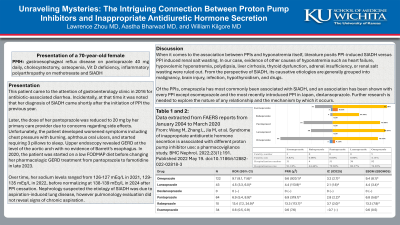Sunday Poster Session
Category: Stomach
P1699 - Unraveling Mysteries: The Intriguing Connection Between Proton Pump Inhibitors and Inappropriate Antidiuretic Hormone Secretion
Sunday, October 27, 2024
3:30 PM - 7:00 PM ET
Location: Exhibit Hall E

Has Audio

Lawrence Zhou, MD
The University of Kansas School of Medicine
Wichita, KS
Presenting Author(s)
Lawrence Zhou, MD1, Aastha V. Bharwad, MD2, William R. Kilgore, MD3
1The University of Kansas School of Medicine, Wichita, KS; 2University of Kansas School of Medicine, Wichita, KS; 3Ascension Medical Group, Wichita, KS
Introduction: Proton pump inhibitor (PPI) usage is incredibly common, but not without side effects. Commonly known side effects include hypomagnesemia. Recent literature has noted an association between syndrome of inappropriate antidiuretic hormone (SIADH) and PPIs. Here we describe a case of an elderly female whose hyponatremia coincided with initiation and cessation of PPI therapy.
Case Description/Methods: A 70 year-old female with past medical history of gastroesophageal reflux disease (GERD) on pantoprazole 40 mg daily, cholecystectomy, and SIADH came to the attention of gastroenterology clinic in 2016 for antibiotic-associated diarrhea. Incidentally, at that time it was noted that her diagnosis of SIADH came shortly after the initiation of PPI the previous year.
Later, the dose of her pantoprazole was reduced to 20 mg by her primary care provider due to concerns regarding side effects. Unfortunately, the patient developed worsened symptoms including chest pressure with burning, aphthous oral ulcers, and started requiring 3 pillows to sleep. Upper endoscopy revealed GERD at the level of the aortic arch with no evidence of Barrett’s esophagus. In 2020, the patient was started on a low FODMAP diet before changing her pharmacologic GERD treatment from pantoprazole to famotidine in late 2023.
Over time, her sodium levels ranged from 126-127 mEq/L in 2021, 129-135 mEq/L in 2022, before normalizing at 138-139 mEq/L in 2024 after PPI cessation. Nephrology suspected the etiology of SIADH was due to aspiration-induced lung disease, however pulmonology evaluation did not reveal signs of chronic aspiration.
Discussion: When it comes to the association between PPIs and hyponatremia itself, literature posits PPI-induced SIADH versus PPI induced renal salt wasting. In our case, evidence of other causes of hyponatremia such as heart failure, hypovolemic hyponatremia, polydipsia, liver cirrhosis, thyroid dysfunction, adrenal insufficiency, or renal salt wasting were ruled out. From the perspective of SIADH, its causative etiologies are generally grouped into malignancy, brain injury, infection, hypothyroidism, and drugs.
Of the PPIs, omeprazole has most commonly been associated with SIADH, and an association has been shown with every PPI except esomeprazole and the most recently introduced PPI in Japan, dexlansoprazole. Further research is needed to explore the nature of any relationship and the mechanism by which it occurs.
Disclosures:
Lawrence Zhou, MD1, Aastha V. Bharwad, MD2, William R. Kilgore, MD3. P1699 - Unraveling Mysteries: The Intriguing Connection Between Proton Pump Inhibitors and Inappropriate Antidiuretic Hormone Secretion, ACG 2024 Annual Scientific Meeting Abstracts. Philadelphia, PA: American College of Gastroenterology.
1The University of Kansas School of Medicine, Wichita, KS; 2University of Kansas School of Medicine, Wichita, KS; 3Ascension Medical Group, Wichita, KS
Introduction: Proton pump inhibitor (PPI) usage is incredibly common, but not without side effects. Commonly known side effects include hypomagnesemia. Recent literature has noted an association between syndrome of inappropriate antidiuretic hormone (SIADH) and PPIs. Here we describe a case of an elderly female whose hyponatremia coincided with initiation and cessation of PPI therapy.
Case Description/Methods: A 70 year-old female with past medical history of gastroesophageal reflux disease (GERD) on pantoprazole 40 mg daily, cholecystectomy, and SIADH came to the attention of gastroenterology clinic in 2016 for antibiotic-associated diarrhea. Incidentally, at that time it was noted that her diagnosis of SIADH came shortly after the initiation of PPI the previous year.
Later, the dose of her pantoprazole was reduced to 20 mg by her primary care provider due to concerns regarding side effects. Unfortunately, the patient developed worsened symptoms including chest pressure with burning, aphthous oral ulcers, and started requiring 3 pillows to sleep. Upper endoscopy revealed GERD at the level of the aortic arch with no evidence of Barrett’s esophagus. In 2020, the patient was started on a low FODMAP diet before changing her pharmacologic GERD treatment from pantoprazole to famotidine in late 2023.
Over time, her sodium levels ranged from 126-127 mEq/L in 2021, 129-135 mEq/L in 2022, before normalizing at 138-139 mEq/L in 2024 after PPI cessation. Nephrology suspected the etiology of SIADH was due to aspiration-induced lung disease, however pulmonology evaluation did not reveal signs of chronic aspiration.
Discussion: When it comes to the association between PPIs and hyponatremia itself, literature posits PPI-induced SIADH versus PPI induced renal salt wasting. In our case, evidence of other causes of hyponatremia such as heart failure, hypovolemic hyponatremia, polydipsia, liver cirrhosis, thyroid dysfunction, adrenal insufficiency, or renal salt wasting were ruled out. From the perspective of SIADH, its causative etiologies are generally grouped into malignancy, brain injury, infection, hypothyroidism, and drugs.
Of the PPIs, omeprazole has most commonly been associated with SIADH, and an association has been shown with every PPI except esomeprazole and the most recently introduced PPI in Japan, dexlansoprazole. Further research is needed to explore the nature of any relationship and the mechanism by which it occurs.
Disclosures:
Lawrence Zhou indicated no relevant financial relationships.
Aastha Bharwad indicated no relevant financial relationships.
William Kilgore indicated no relevant financial relationships.
Lawrence Zhou, MD1, Aastha V. Bharwad, MD2, William R. Kilgore, MD3. P1699 - Unraveling Mysteries: The Intriguing Connection Between Proton Pump Inhibitors and Inappropriate Antidiuretic Hormone Secretion, ACG 2024 Annual Scientific Meeting Abstracts. Philadelphia, PA: American College of Gastroenterology.
